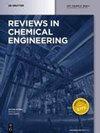负载金属纳米颗粒的聚氨酯纳米复合材料及其催化/抗菌应用:重要综述
IF 6.6
3区 工程技术
Q1 ENGINEERING, CHEMICAL
引用次数: 0
摘要
聚氨酯(PU)属于一类独特的聚合物。聚氨酯的不同特性,如机械强度和生物相容性,可通过与不同的生物和合成聚合物共聚来增强。由于聚氨酯和制备的金属纳米粒子具有协同增效特性,因此聚氨酯作为制备金属纳米粒子(MNPs)的微反应器应用广泛。在过去几年中,金属纳米颗粒聚氨酯复合材料备受关注。这类纳米复合材料将聚氨酯的机械性能与金属纳米粒子的高表面体积比结合在一起。在此,这篇综述文章简要评估了聚氨酯基金属纳米复合材料的不同合成方法,以及通过不同技术评估其特性的表征方法。文章还根据这些聚氨酯基纳米复合材料的催化、抗菌和抗真菌潜力,对其在不同领域的应用进行了批判性描述。此外,还介绍了这些纳米复合材料在纳米过滤器和纳米设备设计领域的未来发展方向,以实现环境修复和可持续发展。本文章由计算机程序翻译,如有差异,请以英文原文为准。
Metal nanoparticles loaded polyurethane nano-composites and their catalytic/antimicrobial applications: a critical review
Polyurethane (PU) belongs to a unique class of polymers. Different properties of PU such as mechanical strength and biocompatibility can be enhanced by co-polymerizing it with different bio and synthetic polymers. It finds huge applications as micro-reactors for the fabrication of metal nanoparticles (MNPs) owing to the synergistic properties of both polyurethane and fabricated metal nanoparticles. Metal nanoparticles fabricated polyurethane have gained much attention in the last few years. These types of nanocomposites hyphenate the mechanical properties of polyurethane with the high surface-to-volume ratio of metal nanoparticles. Here, this review article briefly evaluates different methods of synthesis of polyurethane-based metal nanocomposites and their characterization via different techniques to evaluate their properties. Applications of these polyurethane based nanocomposite materials have also been described critically in different fields depending upon their catalytic, antimicrobial and antifungal potential. Future directions of these nanocomposite materials have also been described in the field of designing of nano-filters and nano-devices in order to attain environmental remediation and sustainability.
求助全文
通过发布文献求助,成功后即可免费获取论文全文。
去求助
来源期刊

Reviews in Chemical Engineering
工程技术-工程:化工
CiteScore
12.30
自引率
0.00%
发文量
37
审稿时长
6 months
期刊介绍:
Reviews in Chemical Engineering publishes authoritative review articles on all aspects of the broad field of chemical engineering and applied chemistry. Its aim is to develop new insights and understanding and to promote interest and research activity in chemical engineering, as well as the application of new developments in these areas. The bimonthly journal publishes peer-reviewed articles by leading chemical engineers, applied scientists and mathematicians. The broad interest today in solutions through chemistry to some of the world’s most challenging problems ensures that Reviews in Chemical Engineering will play a significant role in the growth of the field as a whole.
 求助内容:
求助内容: 应助结果提醒方式:
应助结果提醒方式:


